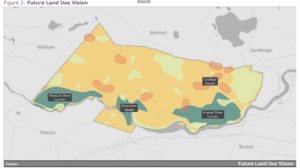Three Watertown neighborhoods are suitable for transformational development including additional multifamily housing, a draft comprehensive plan recommends.
The report by consultants Stantec spotlights Watertown Square’s potential revitalization as a mixed-use district, tapping into vacant parcels and adaptive reuse projects. Two commercial corridors – the eastern half of Arsenal Street and a portion of Pleasant Street near the Waltham line – are identified as suitable for updated zoning as well.
As Watertown and 173 other cities and towns study ways to comply with the state’s MBTA Communities zoning law, which requires legalization of as-of-right multifamily housing districts near transit stops, Watertown Square is a “prime candidate” for high-density multifamily development.
“Watertown Square is the obvious location to explore further due to the convergence of multiple bus routes and history as the city’s business center,” the report states.
Two other neighborhoods are identified as suitable for updated zoning reflecting changing land-use demand.
The eastern portion of Arsenal Street is suitable for regional-scale mixed-use development, including “new construction that replaces outdated single use retail and commercial development with higher density mixed uses set in a walkable street network.”
And the section of Pleasant Street west of Howard Street is suitable for a change from the existing light industrial uses to “more commercial and industrial mixed-use with some housing in limited areas,” the report states.
Watertown’s master plan was last updated in 2015, but the city has been one of top recipients of life science industry growth spilling out of Cambridge. Developers including Alexandria Real Estate Equities, Boylston Properties, The Davis Cos. and Boston Development Group all have lab projects transforming the Arsenal Street and Galen Street commercial districts.
Between 2015 and 2021, Watertown approved 2.9 million square feet of commercial development at 20 major projects. During the same period, Watertown approved 839 housing units.
Housing development could emerge as a driver of future activity, as demand for lab space has declined from its historic 2021 peak.
“While life sciences is a strong growth sector in the Boston area, recent market pressures may slow how quickly space is occupied and create new opportunities for other types of tenants,” the report states.
An open house is scheduled for 6:30 p.m. on March 9 at the Watertown Free Public Library before the draft plan goes to the Planning Board and City Council for review.







